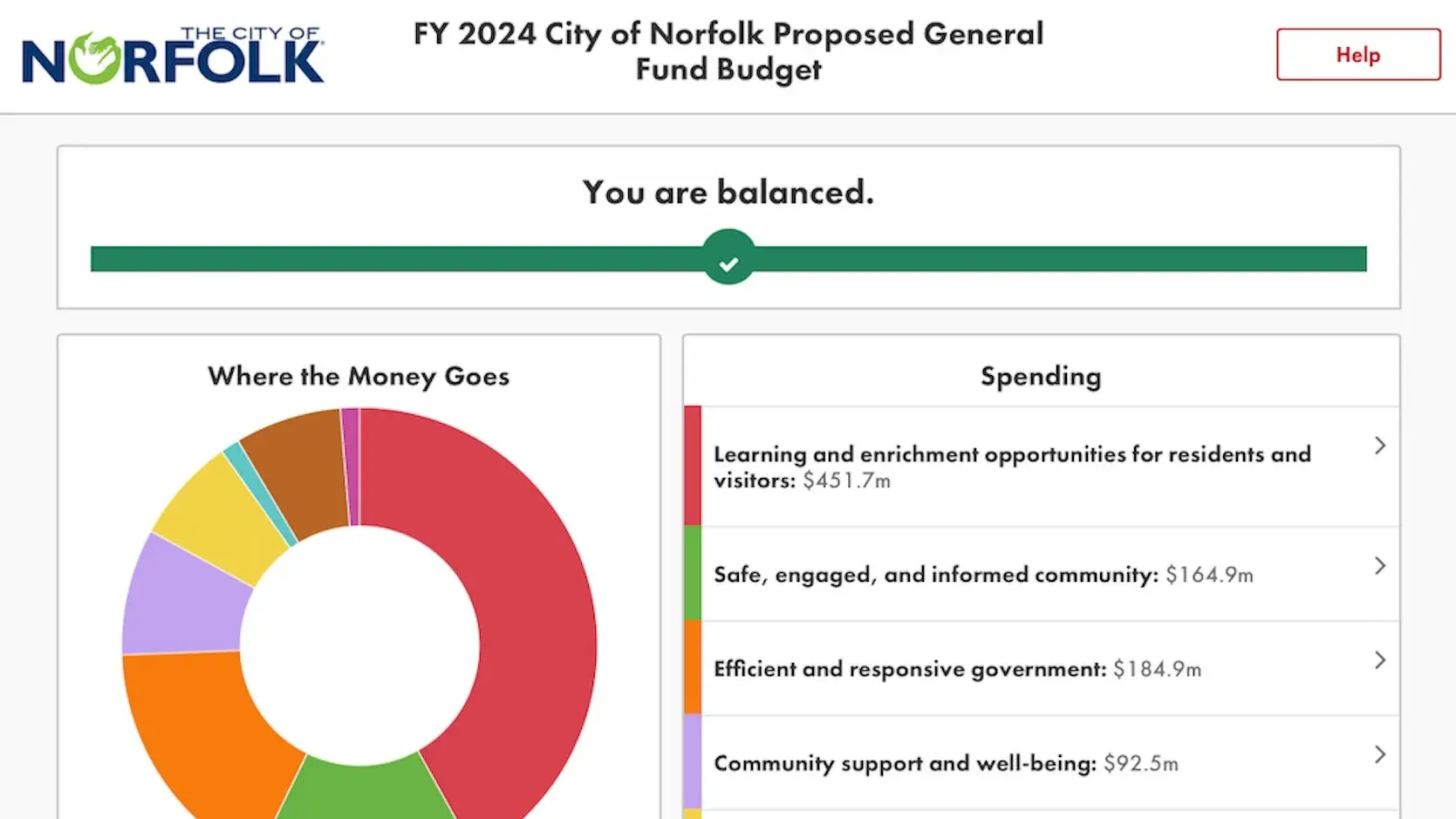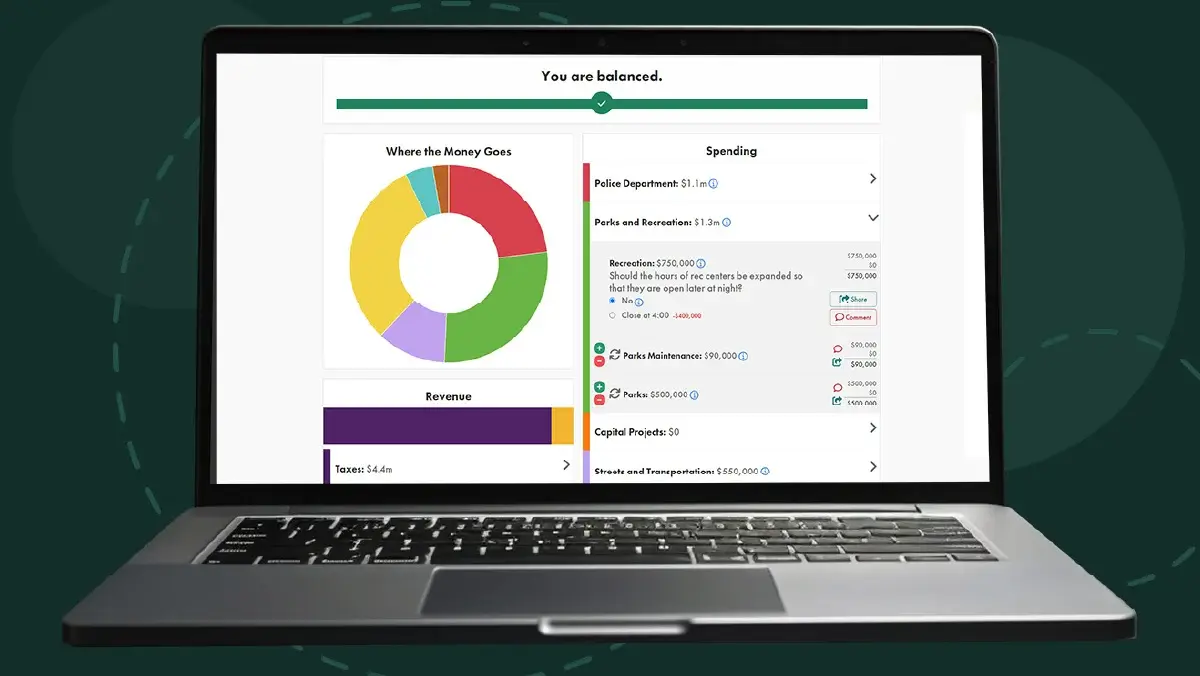Reach Underheard Groups With This Proven Strategy
By Polco on July 21, 2023

Pictured above: A City of Healdsburg translator at work during a community workshop
The City of Healdsburg, California, puts immense effort into reaching populations who don’t usually have a seat at the table.
America has a history of overlooking marginalized groups in public policy decisions. But today, equity is a top priority for many local governments. One way to achieve equity is through resident engagement—giving everyone a fair chance to participate and share their voice. Yet local governments usually struggle to reach underheard groups. The vocal minority often speak for the quieter whole, who tend to be more moderate. The good news is local governments can overcome this challenge. The City of Healdsburg, California, recent budget outreach strategy is an excellent example of how it’s possible.
The Need for Representative Engagement
Healdsburg is a tourist destination of 12,000 residents known for its vineyards and culinary offerings. The City recently made community engagement a top priority. Reaching its underheard population was a prominent focus of the City’s engagement strategy.
 “Healdsburg is an interesting town,” said Andrew Sturmfels, Assistant City Manager.
“Healdsburg is an interesting town,” said Andrew Sturmfels, Assistant City Manager.
The City has a diverse community with shifting demographics. Sixty-six percent of the population is Caucasian, who tend to be older and wealthier than neighboring communities. There is also a large group of seniors on a fixed income who were born and raised in town. And approximately 30% represents the Latino population, many of whom are Spanish-speaking and support the agricultural and hospitality industry that drives the local economy.
Healdsburg's first serious foray into community engagement was for a two-year budgeting plan. The City used Balancing Act by Polco’s Budget Simulation to collect resident feedback for the plan. The simulation mimics Healdsburg’s real-life budget and the constraints officials face. Participants add or subtract dollars to income and expense categories until they break even.
The tool gives government officials data on how residents would allocate the budget. The simulation also educates the public on how the budget works. It helps community members understand the tough choices local governments often have to make.
The City employed multiple strategies to reach the Latino population, teach them how to use the tool, and find out their budgeting priorities.
 A Healdsburg community workshop
A Healdsburg community workshop
Outreach Strategies
1. Partnerships
The first and most important step of the City's strategy was finding the right partner. The City worked with Corazón Healdsburg, a well-known nonprofit and bilingual family resource center, to execute the engagement outreach in Latino communities. Many Latinos in Healdsburg were already familiar with the organization. The pre-established relationship encouraged more people to participate since the engagement request came from a trusted source.
"We developed and implemented a professional services agreement with Corazón to help support our efforts to engage with the Latino community”, Sturmfels said. “Similar to what most cities have when they contract with the Chamber to support business community connectivity, we partner with Corazón to support Latinx community connectivity.”
2. Workshops
New platforms and technology can be confusing to first-time users. Corazón Healdsburg helped the City host three workshops where they went through the Balancing Act simulation process line by line.
The City provided food and childcare. They also hosted the meetings on various days throughout the week at different times so everyone had a chance to participate.
3. Translation and Interpretation
Healdsburg provides all of its messaging materials in English and Spanish. This includes surveys, press releases, and even social media posts. Nearly every piece of communication comes in both languages, including the Balancing Act simulation.
City Council agendas are in Spanish as well. Plus, a live interpreter attends all City Council meetings and public workshops. Spanish-speaking attendees get headsets so they can hear the interpreter in real time. For Council and commission meetings, the City enabled Zoom features that provide closed captioning interpretation in multiple languages.
“The translation services have dramatically improved participation at public workshops,” Sturmfels said. “Residents who don't speak English as their primary language now know when they come to a public meeting that they can participate fully—both in receiving information and knowing they are heard when they provide feedback.”
The translation efforts ensure native Spanish speakers understand whatever content the City produces. It also demonstrates that the City values the Spanish-speaking population’s feedback, which fosters a sense of trust.
4. Door-to-door Outreach
Old fashioned door-knocking may sound like a lot of work, but it is incredibly effective. Corazón Healdsburg acted as the City's feet on the ground.
The nonprofit identified target communities for outreach long before the budgeting project, so they already knew what areas to cover.
“The biggest lesson for me has been you have to meet people where they are,” Sturmfels said. “The Corazón team went door-to-door in many of our harder to reach areas of town and walked people through the tool.”
Having Spanish speakers who were already integrated with the community led to better engagement.
“It's generally hard to get anyone to answer the door and engage, unless they know the person and feel comfortable with them,” Sturmfels said. “In this case, Corazón established itself within the Latino community. They're trusted. When a community member opens the door and sees a shirt with their logo on it they want to hear about what's going on.”
This face time also allowed Corazón Healdsburg an opportunity to share information about their organization, so it was a win-win for the City and the nonprofit.
Outreach Bonus Tip:
Sturmfels said they learned through the budgeting outreach that they needed to give residents an option to participate on paper as well. Paper is particularly useful for older seniors who may not feel comfortable with online tools. The paper option also allowed people more time to provide thoughtful feedback.
In one recent neighborhood safety survey in an historically underheard community, the City partnered with Corazón to hand out paper surveys door-to-door. They later returned to pick them up. This strategy was a big success.
 A Healdsburg community workshop for the Latino population
A Healdsburg community workshop for the Latino population
Reaching Underheard Groups Produces Better Data
Sturmfels said that the Latino community clearly emphasized housing as their top priority. They are even willing to cut into some public safety funds to improve housing, which is uncommon.
The white population is also very concerned about housing. But they also pointed to other priorities, like climate change.
Sturmfels said housing affordability is a top concern for the City Council as well. The budget outreach process emphasized the issue.
The success of the budget outreach led to an entire shift in Healdsburg's community engagement.
“We now apply an equity lens to all of our public engagement work,” Sturmfels said.
For instance, the City used the same strategies in a climate initiative. Leaders used Balancing Act by Polco’s Prioritize tool, which lets residents rank the services or strategies they think are most important.
The City also encouraged and supported new partnerships with a local climate nonprofit to work with Corazón Healdsburg. Sturmfels found that the partnerships connected segments of the community that don't typically interact. The new connections created a better sense of understanding of the different needs members of our community face.
 Improving upon the budget outreach, the City hosted pop-ups at a local coffee shop, the senior center, the recycling center, food bank, labor workforce center, and library for the climate project.
Improving upon the budget outreach, the City hosted pop-ups at a local coffee shop, the senior center, the recycling center, food bank, labor workforce center, and library for the climate project.
The climate outreach was just as successful.
The projects, along with the new development of a Diversity, Equity, and Inclusion plan, helped the City establish best practices. The practices include: translation and interpretation services, paper options, providing childcare and food, workshops on different days and different times, and partnering with organizations in new and unique ways.
Sturmfels stresses that outreach is just as, if not more, important than creating a survey. He says governments can’t sit back and wait for residents to come to them.
“If you are serious about engaging your community, you have to be ready to roll up your sleeves, work hard, and work in new ways. It takes a lot of time, energy and effort. But it's well worth it,” he said.
Dedicated engagement gives local governments valuable data that truly represents all demographics for better decision-making. But it also provides something less tangible.
“True benefits of community building take place when the City creates opportunities for meaningful interaction, “ Sturmfels said.
Representative Community Feedback for Local Governments
Polco’s community engagement and civic data tools makes it easy for local governments to get data that reflects their entire community. Get access to Balancing Act from Polco’s Budget Simulation, expert surveys and polls, and more.
Related Articles
- How Can We Reach Those Hard-to-Reach Populations?
- Gathering the Opinions of Hard-to-Reach Residents
- The Significance of Young, Diverse Voices in Public Policy
Popular posts
Sign-up for Updates
You May Also Like
These Related Stories

Flashback: How Hartford, CT Helped Launch a New Era of Budget Engagement

Norfolk’s Budget Engagement Increases Resident Understanding of the “Delicate Reality of Allocating Funding”


